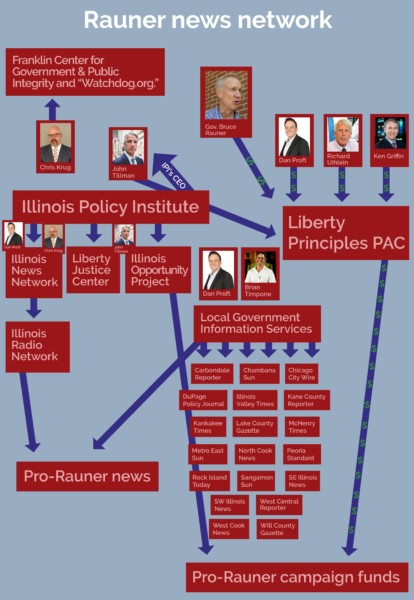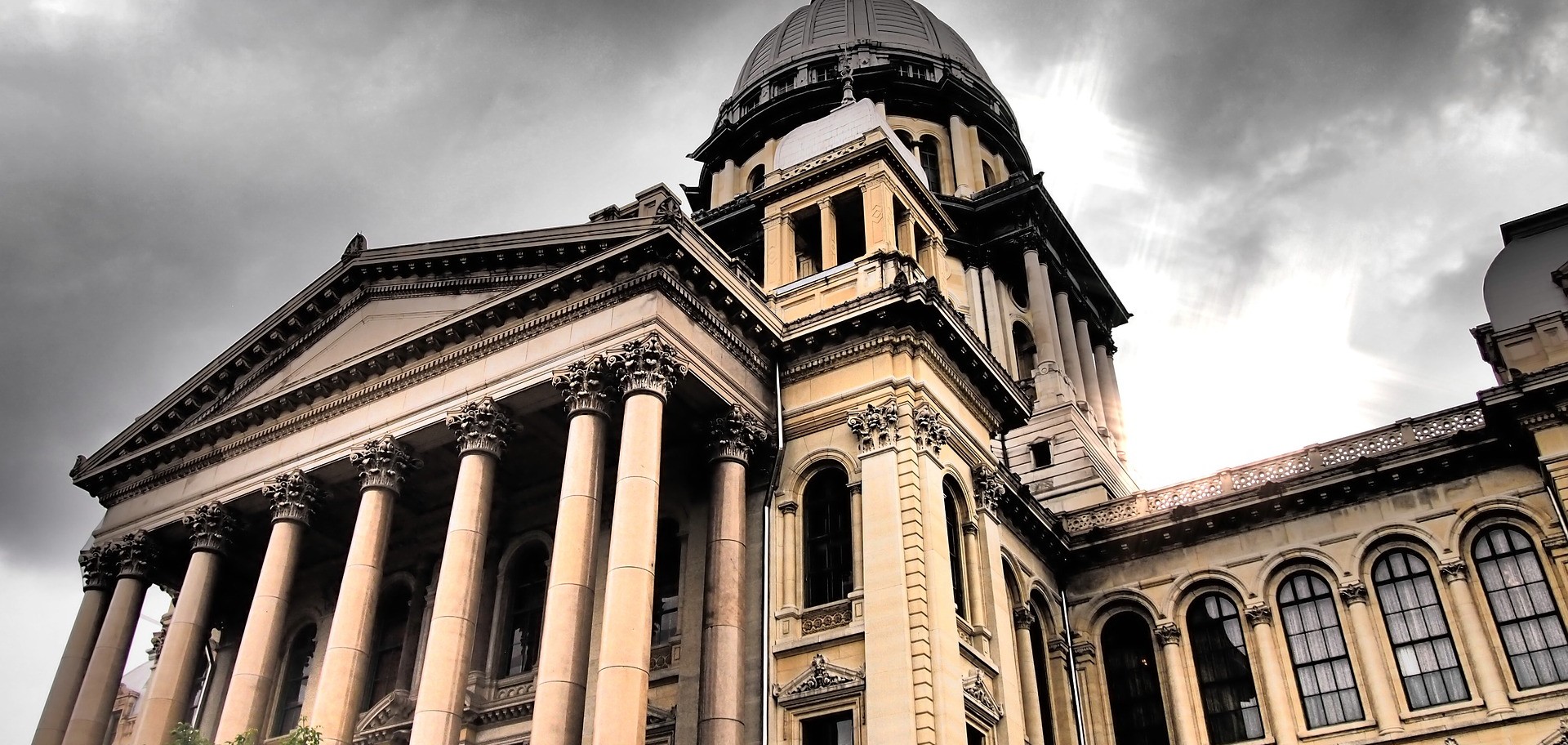Sign up for The Media Today, CJR’s daily newsletter.
THE CITY CLUB OF CHICAGO recently hosted “Exodus from Illinois,” a conversation between local journalists about why thousands of residents have left the city and state in recent years. Along with editorial board members from the Tribune and Sun-Times, the panel also included Dan Proft, an influential conservative radio personality and activist who took to Twitter before the March 6 event to critique the mainstream media outlets of his fellow panelists as biased and elitist:
Why are people leaving IL (like it's on fire)? A riddle wrapped inside a conundrum surrounded by the obvious. A question that mystifies only the champagne Socialists and their media handmaidens. @CityClubChicago https://t.co/HitsvEGmxy
— Dan Proft (@DanProft) March 6, 2018
Some in the audience may have been surprised by Proft’s presence on the panel. Proft—who helped launch Local Government Information Services (LGIS), a state network of 11 newspapers and 20 websites—has helped raise millions for conservative causes, and is connected to the Illinois Policy Institute, a conservative think tank. Both LGIS and the Illinois Policy Institute provide an increasingly vocal counterweight to what they see as their state’s liberal media bias. Each devotes substantial attention on high taxes and poor government performance, and has the support of a loose network of political dollars.
The makeup of the City Club panel, however, is perhaps as revealing as the substance of the conversation. Among the factors that panelists agreed contributed to an Illinois exodus, several—from high taxes to government dysfunction to violence—are pieces of a narrative that a crop of conservative news and information sites in Illinois have drummed up for years, a testament to their efforts to push a statewide political narrative.
ICYMI: An Illinois PAC decides to get into local news—just in time for the primary
LGIS, ACCORDING TO ITS SITE, “publishes hard-hitting, data-driven exposés that arm our readers with the information they need to hold their local governments accountable.” Some LGIS news sites, however, build on that mission statement. The Peoria Standard says it believes “in limited government, in the constructive role of the free market and in the rights of citizens to choose the size and scope of their government and the role it should play in their society,” and refers to funding by like-minded advocates.
Most of the stories published on LGIS news sites are written by algorithm, co-founder Brian Timpone says in an interview with CJR, using software that analyzes data (school test scores, for instance) and splices it by region to deliver to local publications around the state. (Recent headlines include “25 biggest spenders: What Illinois Counties Rank Highest?”; “Which school districts in Illinois are in the worst financial shape?”; and “65 percent of Evansville Attendance Center students fail annual tests.”) When stories are written, their authors are usually freelancers, many of whom report their stories from well beyond the Illinois state line.
A 2017 story in the Chicago Reader noted that many LGIS stories are “dry and data-driven” and written at a distance, but emphasized that “decisions about what stories to publish at all are made locally. And Proft, as he made clear at the get-go, has an agenda.” The Reader summed up its take on LGIS’s coverage: “If your community news is slanted, Dan Proft may be to blame.”
The Illinois Policy Institute, for its part, considers itself a think tank and not a political news site. Still, the group has a powerful voice, says Mike Fourcher, publisher of the Chicago political news site The Daily Line. The policy institute has around 305,000 followers on Facebook, and its website averaged more than 20,000 pageviews per day in 2017, according to numbers provided by IPI.
“I think they do help to define the boundaries of political debate,” Fourcher tells CJR in an email. “They signal to politicians where major donors–who are really paying for the political sites–want things to go.”
[W]hen Gateway or you do a story about the AFL-CIO Sun-Times or the Amazon Post raising the same questions and self-reverential ‘concerns’…then I’ll take inquiries such as yours more seriously.
THE PRECISE RELATIONSHIP between the Illinois Policy Institute and LGIS can be clear as mud. Last year, Gateway Journalism Review, a publication from the journalism school at Southern Illinois University-Carbondale, released a report on the editorial operations and funding of LGIS and other “conservative news organizations connected to the free market, anti-tax, anti-union Illinois Policy Institute.” The network, according to Gateway, is “a formidable conservative force in Illinois politics” and, potentially, “a model for similar networks across the country.” Mike Lawrence, a longtime statehouse reporter who also worked for former Illinois Republican Governor Jim Edgar, says the Gateway report makes clear that there are “readers who couldn’t tell the difference” between the LGIS newspapers and traditional publications.

Image courtesy of the Gateway Journalism Review
Proft calls concerns about the publications’ funding and transparency hypocritical.
“[W]hen Gateway or you do a story about the AFL-CIO Sun-Times or the Amazon Post raising the same questions and self-reverential ‘concerns’ and getting anywhere near the transparency provided by the enterprises with which I’m associated, then I’ll take inquiries such as yours more seriously,” Proft wrote, referring to The Washington Post owner and Amazon CEO Jeff Bezos and the union owners of the Sun-Times. “Until then, I will properly see them as the thinly-veiled political attacks they are by those who don’t care to see conservative perspectives and news stories they would never cover make their way into public discussion.”
As for the Illinois Policy Institute, CEO John Tillman tells CJR that his think tank is “a champion for people who have felt neglected by their elected officials for decades.” Tillman was the subject of a February report by ProPublica Illinois and the Chicago Sun-Times which concluded that concluded that “Tillman and his associates have moved millions of dollars around five interconnected nonprofits they run, steering money to for-profit ventures in which they have a stake.” Tillman responded that “the real intent and purpose of this story—from a union-owned newspaper—is to attack and smear one of the most powerful and compelling threats to the status quo in Illinois.”
I’m sure IPI has some ‘correspondents’ who could fill those slots.
ILLINOIS AND ITS VOTERS would seem to be in dire need of illuminating political coverage: The state is mired in debt after its recently ended two-year budget impasse, the electorate faces a barrage of messages tied to upcoming elections, and there are fewer and fewer reporters at the statehouse. Rich Miller, who frenetically keeps up with statehouse news on his blog Capitol Fax and has perhaps benefited most from traditional outlets’ retrenchment, tells CJR that the Policy Institute is active and often cutthroat on social media, where it effectively pushes for policy changes big and small with a galvanized and outspoken following.
“You’ve got average everyday people complaining about the House rules committee,” says Miller, offering an example of how the Illinois Policy Institute galvanizes its followers through its coverage. “But they’re only getting one side of that.”
Illinois residents may soon see more coverage from the other side of the partisan line. Ameya Pawar, a Chicago alderman and former Democratic gubernatorial candidate, recently announced plans to start a nonprofit newsroom called One Illinois. “I think you fight fire with water,” says Pawar. The Illinois Policy Institute “want[s] to get you angry, and we’ll be focused on solutions. I think storytelling and documenting what’s happening in communities is a good way to do that.”
Brian Timpone, who runs the LGIS hyperlocal publications, is critical of nostalgia for local journalism’s fatter days. “Everyone,” he tells CJR, “reminisces about the glory days of the statehouse.” Two decades ago, Timpone worked as a TV reporter and covered the capitol for WCIA-TV. He was also the co-founder of Journatic, which CJR previously called a “local news outsourcing company” and which was submerged in scandal following revelations of fake bylines and plagiarism. (Journatic changed its name to LocalLabs in 2014.)
Timpone blames traditional reporters for helping to push the state toward its fiscal crisis today. “It’s really criminal what happened to Illinois and it all happened at a time when there were a lot more reporters—and nobody said a damn thing,” Timpone says. “All they did was they reported the news of the day like stenographers, and they’re doing the same thing today as they did then.”
In a Capitol Fax post from 2017, Miller detailed a number of statehouse reductions in Illinois. “Times change, and not always for the better,” he wrote. A commenter replied to Miller’s post, “That’s OK Rich, I’m sure IPI has some ‘correspondents’ who could fill those slots.”
As politically backed, brazenly ideological news sites pick up the slack left by a diminished statehouse press corps, how should news consumers proceed? Josh Sharp, head of the Illinois Press Association, suggested to the Gateway Journalism Review that readers should “look at how a paper presents news. Newspapers not funded by a PAC [political action committee] will have news from both sides.” But Sharp also told Gateway that news sites should be transparent about where their support comes from.
“The First Amendment protects the right for Dan Proft to say whatever he wants,” Sharp told the Gateway Journalism Review. “But perhaps Mr. Proft should be more upfront about the funding of his papers.”
ICYMI: How one AP veteran exposes corruption in Illinois
Has America ever needed a media defender more than now? Help us by joining CJR today.



